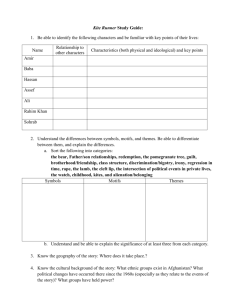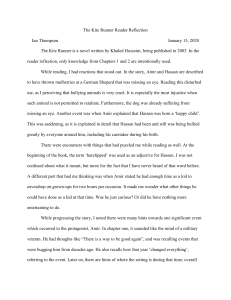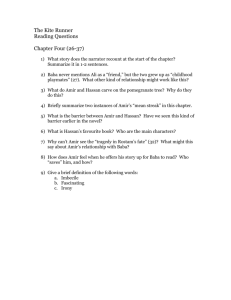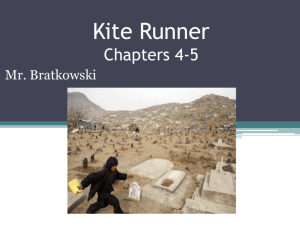The Kite Runner: Chapter Questions & Teacher's Notes
advertisement
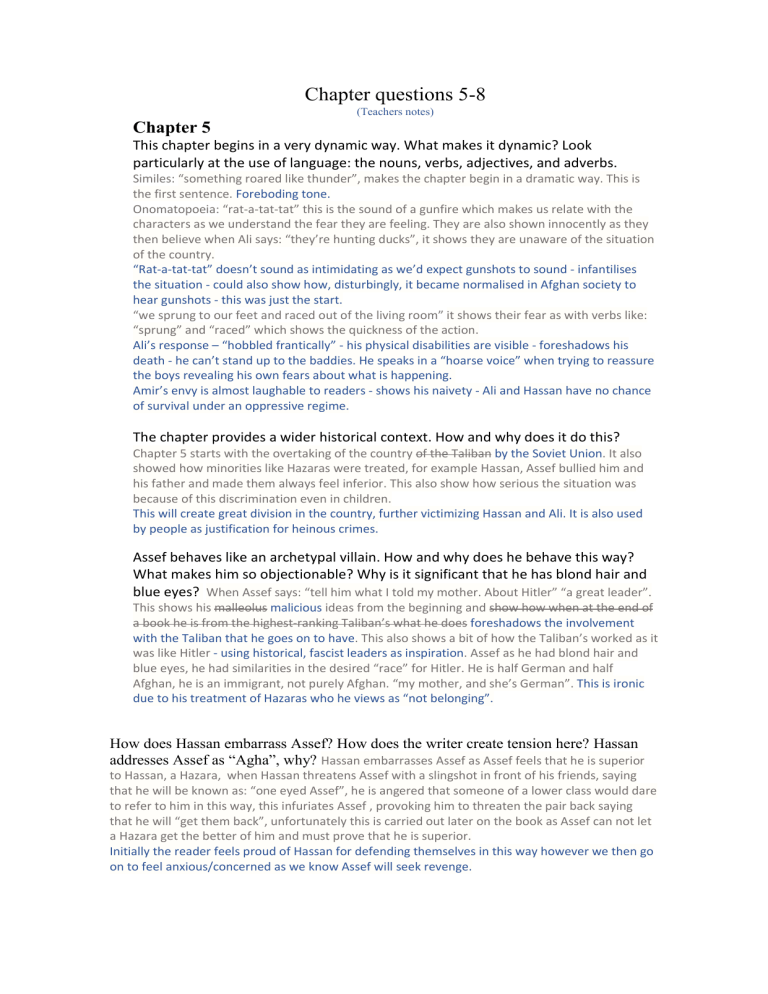
Chapter questions 5-8 (Teachers notes) Chapter 5 This chapter begins in a very dynamic way. What makes it dynamic? Look particularly at the use of language: the nouns, verbs, adjectives, and adverbs. Similes: “something roared like thunder”, makes the chapter begin in a dramatic way. This is the first sentence. Foreboding tone. Onomatopoeia: “rat-a-tat-tat” this is the sound of a gunfire which makes us relate with the characters as we understand the fear they are feeling. They are also shown innocently as they then believe when Ali says: “they’re hunting ducks”, it shows they are unaware of the situation of the country. “Rat-a-tat-tat” doesn’t sound as intimidating as we’d expect gunshots to sound - infantilises the situation - could also show how, disturbingly, it became normalised in Afghan society to hear gunshots - this was just the start. “we sprung to our feet and raced out of the living room” it shows their fear as with verbs like: “sprung” and “raced” which shows the quickness of the action. Ali’s response – “hobbled frantically” - his physical disabilities are visible - foreshadows his death - he can’t stand up to the baddies. He speaks in a “hoarse voice” when trying to reassure the boys revealing his own fears about what is happening. Amir’s envy is almost laughable to readers - shows his naivety - Ali and Hassan have no chance of survival under an oppressive regime. The chapter provides a wider historical context. How and why does it do this? Chapter 5 starts with the overtaking of the country of the Taliban by the Soviet Union. It also showed how minorities like Hazaras were treated, for example Hassan, Assef bullied him and his father and made them always feel inferior. This also show how serious the situation was because of this discrimination even in children. This will create great division in the country, further victimizing Hassan and Ali. It is also used by people as justification for heinous crimes. Assef behaves like an archetypal villain. How and why does he behave this way? What makes him so objectionable? Why is it significant that he has blond hair and blue eyes? When Assef says: “tell him what I told my mother. About Hitler” “a great leader”. This shows his malleolus malicious ideas from the beginning and show how when at the end of a book he is from the highest-ranking Taliban’s what he does foreshadows the involvement with the Taliban that he goes on to have. This also shows a bit of how the Taliban’s worked as it was like Hitler - using historical, fascist leaders as inspiration. Assef as he had blond hair and blue eyes, he had similarities in the desired “race” for Hitler. He is half German and half Afghan, he is an immigrant, not purely Afghan. “my mother, and she’s German”. This is ironic due to his treatment of Hazaras who he views as “not belonging”. How does Hassan embarrass Assef? How does the writer create tension here? Hassan addresses Assef as “Agha”, why? Hassan embarrasses Assef as Assef feels that he is superior to Hassan, a Hazara, when Hassan threatens Assef with a slingshot in front of his friends, saying that he will be known as: “one eyed Assef”, he is angered that someone of a lower class would dare to refer to him in this way, this infuriates Assef , provoking him to threaten the pair back saying that he will “get them back”, unfortunately this is carried out later on the book as Assef can not let a Hazara get the better of him and must prove that he is superior. Initially the reader feels proud of Hassan for defending themselves in this way however we then go on to feel anxious/concerned as we know Assef will seek revenge. Why does Baba pay for corrective surgery to Hassan’s lip? Hassan is actually Baba’s son, but no one else knows this, each year he gives him birthday presents. This year he gave him this as “ this present will last [ him ] forever”. To correct an “abnormality”. Potential guilt Baba feels. Does Baba feel jealousy towards Ali that he gets to father his son? He repairs his lip (a feature Ali also has) so that he will look less like Ali and more like Baba. Sadly, this corrective procedure does not change the way others treat him as he is, and always will be, a Hazara. Chapter 6 The novel switches to the “present continuous tense” — why does it do this? Hosseini does this to create a sense of involvement and to feel nearer to Amir. This is a contrast with the other chapters and in this way, we can see more what Amir felt in the moment which contrasts with the other chapters where we read it with his future opinion. It is building the excitement for the tournament. Highlights how vivid a memory this is for Amir - he is right back there whenever he thinks of it. The chapter deploys colloquial language, listing and short, simple sentences. Why does it do this? Amir is telling this story as a child during this chapter, this shows how vivid this memory is on his mind as he can recall it as he would have in that moment as a child, using the simple language a 12/13-year-old child would. In what way does the kite work as a symbol in the novel? Look at this quote and analyse the different connotations of kites in the novel: “Afghans are an independent people. Afghans cherish custom but abhor rules. And so it was with kite flying. The rules were simple. No rules. Fly your kite. Cut your opponents. Good luck.” In this chapter, kite flying is a reminder of Amir's betrayal of Hassan. As Amir competes in the kite-fighting tournament, he hopes to win to gain his father's approval and love. However, Amir ends by betraying Hassan by not coming to his aid when Hassan is attacked by Assef, leading to Hassan's severe trauma. After witnessing Hassan's brutal assault, Amir becomes haunted by his actions and his failure to intervene. Winning the kite-fighting tournament was his attempt to gain his father's love and forgiveness, as well as to somehow make amends for his betrayal of Hassan. This is because kite flying represents freedom to kite running, a lack of rules, a masculine-dominated activity. This quote foreshadows how the Taliban’s, Assef mostly, to gain power will do anything in their hands, as what is important is “to fly your kite” and be the last one standing. Why does Amir continue teasing Hassan, even though he is the best “kite-runner”? What is the significance of kite-running? Amir feels jealous towards Hassan. Amir constantly seeks his father Baba's approval and love. Baba highly values courage and strength, qualities that Hassan possesses naturally. Amir, in contrast, often feels overshadowed and less worthy. Teasing Hassan is a way for Amir to temporarily feel superior. Kite-running is what symbolizes what a good Afghan boy is, Hassan is very good at this which undermines Amir. Baba will feel proud of Hassan as it is what makes a good Afghan, which in this part Amir doesn’t highlight. Chapter 7 What is the significance of Hassan’s dream? The significance of Hassan’s dream is that it symbolizes the friendship that Hassan and Amir have, and they will later show this in the Kite Tournament as well as their teamwork. The dream shows how much Hassan trusts and depends on Amir as he goes with him into the water even though he has the fear of the monster and thanks to Amir’s convincing that there is nothing there he goes in. The moment in the dream where they both realize that there is no monster is ironic as later in the novel Amir presents himself as the real monster in Hassan’s life as he shows how selfish and cowardly he is towards difficult situations. How does the writer generate excitement and suspense in his descriptions of the kite tournament? Adjectives: “the streets glistened” and “sky was blameless blue” these create a beautiful image in the reader’s mind. Similes: “two dozen kites already hung in the sky, like paper sharks roaming for prey” used to emphasize the excitement and suspense of the kite tournament. This also suggests that like the kites, Amir and Hassan are “prey” to the other characters. This foreshadows the later events in the scene when Hassan is Assef’s prey. What figurative language does the writer use to describe the kites? Hosseini describes the kites as beings of their own, he also uses the kites as an extension of Amir, for example when flying the kite Amir claims that he is flying himself. Hosseini exaggerates the act of kite running, inducing more thrill into it than what would happen in kite running. Kites = predators = free to roam the skies = “blameless blue” How does Assef taunt Hassan? Assef carries out the ritual of the sheep for Eid on Hassan, however instead of killing him as one would the sheep he rapes him, which some would consider a fate worse than death. Why does the narrative become fragmented and dream-like when discussing the violence wrought upon Hassan by Assef? How are Hassan, Amir and Assef presented in the “rape” scene? Why does Amir find it difficult to accept his own behaviour? Chapter 8 How is Hassan presented in this chapter? Hassan is presented as traumatized and his decaying mental health is reflected on his wrinkled and tired face, gray circles under his puffed-up eyes and generally older appearance. He dedicates himself to do his chores and then goes back to sleep as if his soul had been robbed from him. He has not only been robbed from his purity and innocence but from his only friend too. Hassan really needed someone at that moment but the only person that potentially knew was pushing him away so he had to agonize in silence. We get to see how fragile Hassan really is. The reader empathizes even more with Hassan when they see that he holds nothing against Amir and tries to fix the problem, revealing how important Amir was for Hassan, and ease the tension between them but is faced with an embarrassed and guilty Amir who is only strengthening the walls between them. His lower status and his inferiority for being a Hazara is highlighted when he feels obliged to do his work as a servant even when he is dealing with such a traumatic and tough event. Why does Amir resent his father´s concerns about Hassan’s illness? Amir feels really jealous about his father feeling concerned about Hassan´s health. He might be triggered by the fact that his father cares so much about one of his servants when he doesn't show much concern or interest on his own as it might suggest that Baba does not really care about him and that even a Hazara is more important to him. Maybe if Amir was the one who was ill Baba might have assumed that he was exaggerating or something as he did not view him as a man. Yet, it could also be because he feels uncomfortable talking about that topic as it might lead Baba to ask more and more questions. How do we know that Amir is feeling very guilty? Firstly, Amir tries to avoid Hasan as much as possible as he possibly does not know how to act around him and does not want to face reality and be reminded of his awful sin; letting his friend get raped. Secondly, he tries to get Hassan against him by attacking him with the pomegranates, in order to compensate for things and therefore reduce the guilt he feels. He was desperately trying to get Hassan mad at him so he could receive a punishment even if it was not necessarily for abandoning him. Lastly, we see how extremely guilty he was feeling when he tried to get rid of Hassan so he doesn't have to be constantly reminded of how cowardly he acted in that situation. In what ways is Amir an anti-hero? Amir is the main character and he lacks courage and morality. He is a flawed character who sometimes feels rejected by society, including his own father for liking literature and not fitting in the typical Afghan society. He has made bad decisions and his attitude is quite questionable and disapproved of by the reader (at least at this stage), especially when they see how desperately he is seeking attention. We see how other characters in his surroundings have more heroic qualities but he is still the main focus as he is literally the narrator and the whole story revolves around him. Baba is impressed by Assef. Why? What present does Assef give Amir and what does he do with it? Assef presents himself as the manly son that every Afghan man would have wanted. Arguably, this is quite ironic as we see how uncomfortable, controlled and inferior his own parents feel towards him. Baba is sometimes disappointed about having Amir as a son as he doesn't fit in those expectations so Baba’s fascination for him is intensified. Assef gives Amir Hitler’s biography which symbolizes and forebodes the cruel and tyrannical aspirations that he has and worries the reader as it shows how Hitler will live on to the next generations and a similar pattern will be repeated. Amir just throws it in the bin. Why does the chapter end by talking about Amir´s sin? To show what a huge impact Hassan’s abuse had on Amir as even when so many people are celebrating him and congratulating him he can not put it behind. This suggests he will not be able to move on and it will therefore keep tormenting him for the rest of his life unless he does something. The fact that he will be constantly reminded is confirmed when he sees Hasan serving drinks to Assef and he feels even worse because for the second time he can just watch and observe how ruined society is.
